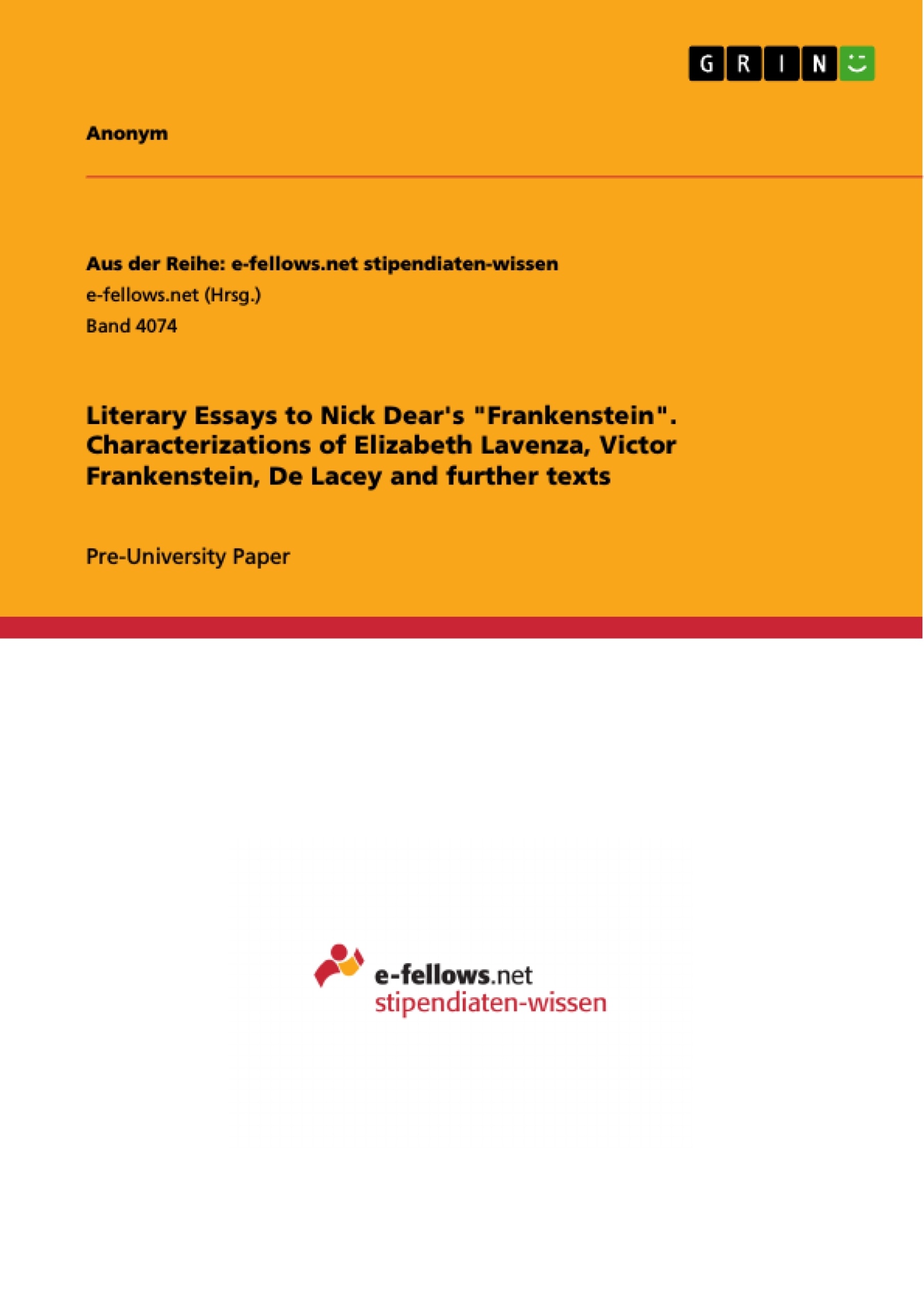Diese Ausarbeitung beinhaltet insgesamt 6 analytische Texte zu Nick Dear's Frankenstein - darunter drei Charakterisierungen zu wichtigen Figuren aus dem Drama (Elizabeth Lavenza, Victor Frankenstein und De Lacey), eine Zusammenfassung, eine Analyse und einen schriftlichen Kommentar.
Alle Texte sind nach einer angegebenen Aufgabenstellung geschrieben, klar strukturiert und eignen sich deswegen perfekt zum Abgleich/Lernen/als Vorbereitung für die Schule.
Table of Contents
- Summary of Scene 25 and 29
- Written Characterization of Elizabeth Lavenza
- Written Characterization of Victor Frankenstein
- Written Characterization of De Lacey
- Analysis of the Creature's Intellectual and Moral Development
- Comment on the Creature's Development
Objectives and Key Themes
This work aims to analyze characterizations and thematic developments in Nick Dear's play "Frankenstein," focusing specifically on Elizabeth Lavenza, Victor Frankenstein, and De Lacey. The analysis will also explore the intellectual and moral development of the creature.
- Character analysis of key figures in the play.
- Exploration of the relationship dynamics between the characters.
- Examination of the creature's development and its moral implications.
- Analysis of the play within the context of 19th-century gender roles.
- Discussion of scientific ambition and its consequences.
Chapter Summaries
Summary of Scene 25 and 29: This chapter summarizes two key scenes from Nick Dear's "Frankenstein." Scene 25 depicts a conflict between Victor Frankenstein and Elizabeth Lavenza as Victor prepares to leave for England to continue his experiments, postponing their wedding. Elizabeth's attempts to understand Victor's work and her desire to accompany him highlight the clash between scientific ambition and personal relationships. Scene 29 unfolds after Victor's return, revealing his creation and destruction of a female creature and the resulting threat from the vengeful creature. Elizabeth's incredulity and subsequent questioning of Victor's actions expose the devastating consequences of his unchecked ambition and the breakdown of their relationship.
Written Characterization of Elizabeth Lavenza: This chapter provides a detailed character analysis of Elizabeth Lavenza, exploring her relationship with Victor Frankenstein. Elizabeth is presented as a complex character, defying the stereotypical 19th-century feminine ideal. She displays intelligence, determination, and a proactive approach in her interactions with Victor, questioning his decisions and challenging his assumptions. Her unwavering love for Victor, despite his flaws and obsessions, is contrasted with her independent spirit and desire for fulfillment beyond a traditional female role. The analysis highlights her emotional depth and her ability to confront Victor's scientific obsession.
Written Characterization of Victor Frankenstein: [This section would contain a summary of the chapter analyzing Victor Frankenstein's character. Due to the limited text provided, this section cannot be completed.]
Written Characterization of De Lacey: [This section would contain a summary of the chapter analyzing De Lacey's character. Due to the limited text provided, this section cannot be completed.]
Analysis of the Creature's Intellectual and Moral Development: [This section would contain a summary of the chapter analyzing the creature's development. Due to the limited text provided, this section cannot be completed.]
Comment on the Creature's Development: [This section would contain a summary of the chapter commenting on the creature's development. Due to the limited text provided, this section cannot be completed.]
Keywords
Nick Dear, Frankenstein, Elizabeth Lavenza, Victor Frankenstein, De Lacey, creature, scientific ambition, 19th-century gender roles, character analysis, moral development, relationships.
Frequently Asked Questions: Frankenstein - A Character and Thematic Analysis
What is the purpose of this document?
This document provides a comprehensive preview of a work analyzing characterizations and thematic developments in Nick Dear's play "Frankenstein." It includes a table of contents, objectives and key themes, chapter summaries, and keywords. The analysis focuses on Elizabeth Lavenza, Victor Frankenstein, De Lacey, and the creature's intellectual and moral development.
What are the key themes explored in the analysis?
The analysis explores several key themes, including character analysis of key figures, the relationship dynamics between characters, the creature's development and its moral implications, 19th-century gender roles, and the consequences of scientific ambition.
Which characters are the main focus of the analysis?
The primary focus is on Elizabeth Lavenza, Victor Frankenstein, and De Lacey. The analysis also extensively covers the creature's development.
What aspects of the creature are analyzed?
The analysis delves into the creature's intellectual and moral development, exploring its evolution throughout the play and the implications of its actions.
What is included in the chapter summaries?
The provided preview includes summaries of key scenes (Scenes 25 and 29), detailed character analyses of Elizabeth Lavenza, and outlines for further character analyses of Victor Frankenstein and De Lacey, as well as the creature's development. However, the summaries for Victor Frankenstein, De Lacey, and the creature's development are incomplete due to the limited text available.
What is the significance of Scene 25 and Scene 29?
Scene 25 highlights the conflict between Victor's scientific ambition and his personal relationship with Elizabeth, while Scene 29 reveals the devastating consequences of Victor's actions and the breakdown of their relationship following the creation and destruction of a female creature.
How is Elizabeth Lavenza characterized in the analysis?
Elizabeth is portrayed as a complex character who defies the stereotypical 19th-century feminine ideal. She is intelligent, determined, and challenges Victor's decisions, demonstrating both unwavering love and an independent spirit.
What are the keywords associated with this analysis?
Key words include: Nick Dear, Frankenstein, Elizabeth Lavenza, Victor Frankenstein, De Lacey, creature, scientific ambition, 19th-century gender roles, character analysis, moral development, and relationships.
- Quote paper
- Anonym (Author), 2020, Literary Essays to Nick Dear's "Frankenstein". Characterizations of Elizabeth Lavenza, Victor Frankenstein, De Lacey and further texts, Munich, GRIN Verlag, https://www.grin.com/document/1174058



